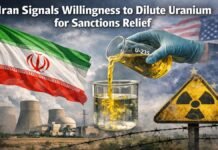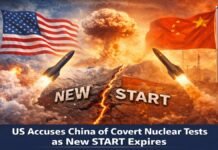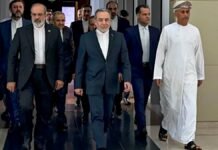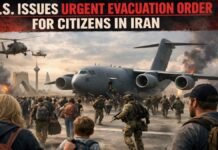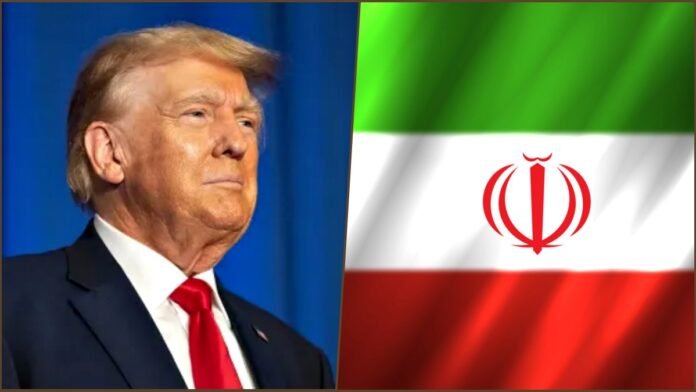
Key Points:
- US President Donald Trump has threatened Iran with unprecedented bombings and secondary tariffs if it refuses to agree to a new nuclear deal.
- Iran rejected direct negotiations but left the door open for indirect talks through Oman.
- Tensions escalate as Iran’s nuclear program advances and regional conflicts intensify.
- Trump’s ultimatum follows his withdrawal from the 2015 JCPOA nuclear agreement during his first term.
- US military deployments, including B-2 bombers, signal preparedness for potential action against Iran.
Washington D.c.: In a stark warning delivered during an NBC News interview on Saturday, US President Donald Trump threatened Iran with severe consequences if it fails to agree to a new nuclear deal. He stated, “If they don’t make a deal, there will be bombing—the likes of which they have never seen before.” Trump also hinted at imposing secondary tariffs on Iran, echoing his “maximum pressure” strategy from his first term.
Iran Rejects Direct Talks but Signals Openness to Indirect Negotiations
Iranian President Masoud Pezeshkian confirmed on Sunday that Tehran had responded to Trump’s letter via Oman, rejecting direct negotiations but expressing willingness for indirect discussions. Pezeshkian emphasized that trust must be rebuilt following Trump’s unilateral withdrawal from the 2015 Joint Comprehensive Plan of Action (JCPOA) during his first term in 2018.
“We are not averse to discussions; rather, it is the violation of commitments that has created challenges for us thus far,” Pezeshkian said during a televised Cabinet meeting. He added that indirect talks could proceed if the US demonstrates credible efforts to restore trust.
The JCPOA Fallout and Escalating Tensions
The JCPOA, signed in 2015 under Barack Obama’s administration, was designed to restrict Iran’s nuclear program in exchange for sanctions relief. However, Trump withdrew from the agreement in 2018, calling it “one of the worst and most one-sided transactions” for the US. Since then, he has reimposed sweeping sanctions on Iran, targeting its energy, petrochemical, and financial sectors.
In response, Iran has significantly expanded its uranium enrichment activities beyond JCPOA limits, raising concerns among Western powers about its potential pursuit of nuclear weapons capability claims Tehran denies, insisting its program is solely for civilian energy purposes.
The situation has been further complicated by regional conflicts involving Iranian-backed groups such as Hamas and Hezbollah. Recent Israeli airstrikes in Gaza and Lebanon have weakened these proxies, while US military actions against Houthi rebels in Yemen signal broader pressure on Iran’s “Axis of Resistance.”
Trump’s Ultimatum and Military Preparedness
Trump’s letter to Iranian Supreme Leader Ayatollah Ali Khamenei reportedly gave Tehran a two-month deadline to sign a new nuclear deal or face military action. The deployment of B-2 stealth bombers to Diego Garcia military base in the Indian Ocean underscores the seriousness of Trump’s threats. A US official described the deployment as “not disconnected” from Trump’s ultimatum.
While Trump has expressed hope for diplomacy, his warnings mark one of the strongest statements against Iran since tensions began escalating under his administration.
Regional Implications and Global Concerns
The intensifying standoff between Washington and Tehran has raised alarms globally. Analysts warn that military action could destabilize the Middle East further, exacerbating humanitarian crises and economic disruptions across the region.
Iran’s rejection of direct talks highlights deep mistrust between the two nations after years of sanctions and conflict. Meanwhile, European powers continue advocating for diplomatic solutions to salvage remnants of the JCPOA framework.
As Trump pushes for renewed negotiations with Iran under mounting threats of bombings and tariffs, the stakes remain high for both nations. While indirect talks may offer a glimmer of hope for diplomacy, escalating military deployments suggest that time is running out for peaceful resolutions.
The world watches closely as this geopolitical drama unfolds one that could redefine regional dynamics and global security in the months ahead.








































